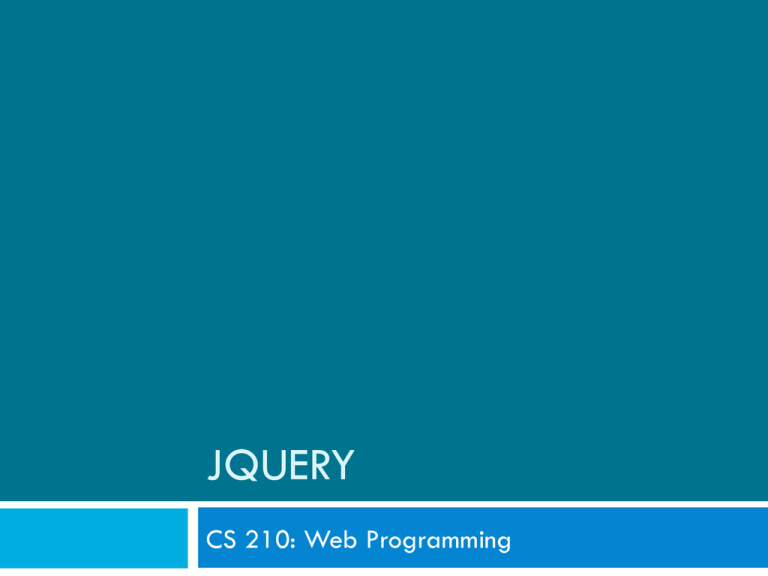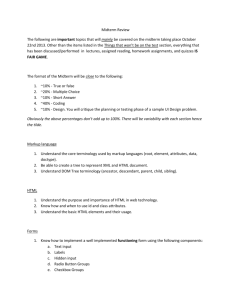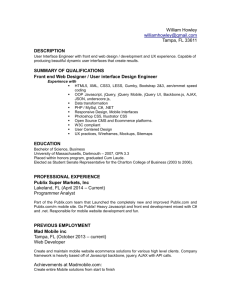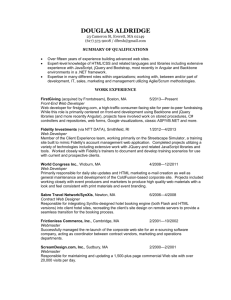JQUERY CS 210: Web Programming
advertisement

JQUERY
CS 210: Web Programming
Announcements
2
Second Test: Wednesday April 23
¨ Project Presentations
¨
¤ Monday,
April 28
¤ Wednesday, April 30
CSC 210
Scrum Masters
3
Backslash CAROLYN SOHMER C.O.D.E. MATTHEW GRAICHEN Cellar ALEXANDER FEISZLI ContraWeb YI LU Hacklemore CHRISTOPHER DAWSON Lannister RISHI SHARMA Llama CONNOR DENT Sk3m Team SARAH HARARI SqlThePrql CIARAN DOWNEY Synapps WOLF HONORE Tautology EVAN MCLAUGHLIN Team RNG JINZE AN CSC 210
What is jQuery?
¨
jQuery is a fast and concise JavaScript Library that
simplifies HTML document traversing, event
handling, animating, and Ajax interactions for rapid
web development. (jQuery.com)
Why learn jQuery?
¨
It manages cross browser differences
¤ Less
¨
to worry about
Write less, do more:
¤ $("p.neat").addClass("ohmy").show("slow");
¨
Performance
¤ jQuery
¨
Plugins
¤ There
¨
has been optimized to run fast
are a lot of other things that run on jQuery
It’s standard
Downloading and using jQuery UI
6
<script src="https://ajax.googleapis.com/ajax/libs/jquery/1.7.2/jquery.min.js" type="text/javascript"></script> <script src="https://ajax.googleapis.com/ajax/libs/jqueryui/1.8.21/jquery-­‐ui.min.js" type="text/javascript"></script> <!-­‐-­‐ If you want the default ui widget stylings -­‐-­‐> <link href="http://ajax.googleapis.com/ajax/libs/jqueryui/1.8.21/themes/ui-­‐lightness/jquery-­‐ui.css" rel="stylesheet" type="text/css" />
¨
¨
¨
CS 380
or download it, extract its .js files to your project folder
documentation available on the jQuery UI API page
the CSS is optional and only needed for widgets at the
end
window.onload
¨
We cannot use the DOM before the page has been
constructed. jQuery gives us a more compatibile
way to do this.
¤ The
DOM way
window.onload = function() { // do stuff with the DOM }
¤ The
direct jQuery translation
$(document).ready(function() { // do stuff with the DOM });
¤ The
jQuery way
$(function() { // do stuff with the DOM });
8
Standup
Discuss questions with your Scrum Team
CSC 210
9
Quiz
CS380
Team Quiz (team name & members)
10
CS380
Aspects of the DOM and jQuery
Identification: how do I obtain a reference to the
node that I want.
¨ Traversal: how do I move around the DOM tree.
¨ Node Manipulation: how do I get or set aspects of
a DOM node.
¨ Tree Manipulation: how do I change the structure
of the page.
¨
The DOM tree
Selecting groups of DOM objects
name
description
getElementById
returns array of descendents with the
given tag, such as "div"
getElementsByTagName
returns array of descendents with the
given tag, such as "div"
getElementsByName
returns array of descendents with the
given name attribute (mostly useful for
accessing form controls)
querySelector *
returns the first element that would be
matched by the given CSS selector
string
querySelectorAll *
returns an array of all elements that
would be matched by the given CSS
selector string
jQuery node identification
// id selector var elem = $("#myid");
// group selector var elems = $("#myid, p");
// context selector var elems = $("#myid < div p"); •
// complex selector var elems = $("#myid < h1.special:not(.classy)");
jQuery Selectors
¨
http://api.jquery.com/category/selectors/
jQuery / DOM comparison
DOM method
jQuery equivalent
getElementById("id")
$("#id")
getElementsByTagName("tag")
$("tag")
getElementsByName("somename")
$("[name='somename']")
querySelector("selector")
$("selector")
querySelectorAll("selector")
$("selector")
Exercise
¨
Use jQuery selectors to identify elements with these
properties in a hypothetical page:
¤ All p tags
that have no children, but only if they don't have
a class of ignore
¤ Any element with the text "REPLACE_ME" in it.
¤ All div tags with a child that has a class of special
¤ All heading elements (h1, h2, h3, h4, h5, h6)
¤ Every other visible li.
¨
¨
Use the DOM API to target the #square and
periodically change it's position in a random direction.
Use jQuery selectors instead of the DOM API.
jQuery terminology
¨
the jQuery function
refers to the global jQuery object or the $ function
depending on the context
¨
a jQuery object
the object returned by the jQuery function that often
represents a group of elements
¨
selected elements
the DOM elements that you have selected for, most likely
by some CSS selector passed to the jQuery function and
possibly later filtered further
The jQuery object
¨
¨
¨
The $ function always (even for ID selectors) returns an arraylike object called a jQuery object.
The jQuery object wraps the originally selected DOM objects.
You can access the actual DOM object by accessing the
elements of the jQuery object.
// false document.getElementById("id") == $("#myid"); document.querySelectorAll("p") == $("p"); // true document.getElementById("id") == $("#myid")[0]; document.getElementById("id") == $("#myid").get(0); document.querySelectorAll("p")[0] == $("p")[0];
Using $ as a wrapper
$ adds extra functionality to DOM elements
¨ passing an existing DOM object to $ will give it the
jQuery upgrade
¨
// convert regular DOM objects to a jQuery object var elem = document.getElementById("myelem"); elem = $(elem); var elems = document.querySelectorAll(".special"); elems = $(elems);
DOM context identification
¨
¨
¨
You can use querySelectorAll() and querySelector() on any
DOM object.
When you do this, it simply searches from that part of the
DOM tree downward.
Programmatic equivalent of a CSS context selector
var list = document.getElementsByTagName("ul")[0]; var specials = list.querySelectorAll('li.special');
find / context parameter
¨
jQuery gives two identical ways to do contextual
element identification
var elem = $("#myid"); // These are identical var specials = $("li.special", elem); var specials = elem.find("li.special");
Types of DOM nodes
<p> This is a paragraph of text with a <a href="/path/page.html">link in it</a>. </p>
Traversing the DOM tree
24
name(s)
description
firstChild, lastChild
start/end of this node's list of
children
childNodes
array of all this node's
children
nextSibling, previousSibling
neighboring nodes with the
same parent
parentNode
the element that contains this
node
• complete list of DOM node properties
• browser incompatiblity information (IE6 sucks)
CS380
DOM tree traversal example
25
<p id="foo">This is a paragraph of text with a
<a href="/path/to/another/page.html">link</a>.</p>
HTML CS380
Elements vs text nodes
26
<div>
<p>
This is a paragraph of text with a
<a href="page.html">link</a>.
</p>
</div>
HTML Q: How many children does the div above have?
¨ A: 3
¨
¤ an
element node representing the <p>
¤ two text nodes representing "\n\t" (before/after the
paragraph)
¨
Q: How many children does the paragraph have?
The a tag?
jQuery traversal methods
¨
http://api.jquery.com/category/traversing/
jQuery tutorials
Code Academy
¨ Code School:
¨
http://www.codeschool.com/courses/jquery-air-firstflight


